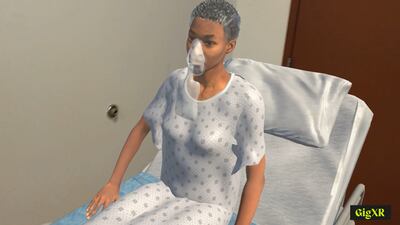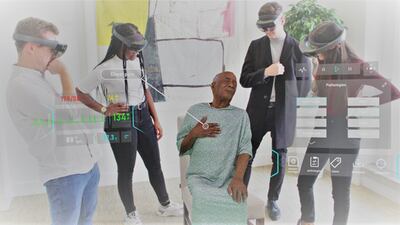A ground-breaking new medical technique using holographic models of patients is set to offer future doctors training in the treatment of illnesses by tuning in from around the world.
The innovative method has been pioneered at Addenbrooke’s Hospital in Cambridge in the UK, where medical students are being prepared for the job in a previously unheard-of scenario.
Students use a mixed-reality training system called HoloScenarios, which enables teaching and learning with lifelike holograms which are accessible from abroad.
The practice is proving to be a more cost-effective medical training programme compared to traditional simulation which requires more resources and expense for maintaining labs and hiring patient actors.
The developers — Cambridge University Hospitals NHS Foundation Trust (CUH), the University of Cambridge and Los Angeles tech company GigXR — believe HoloScenarios could drastically alter the way in which future generations of medical students are given the skills needed for the job.
Students take part by donning mixed-reality headsets which enables them to see each other while also interacting with a multilayered, medically accurate holographic patient.

University of Cambridge students are set to complete several modules using the technology, the first of which focuses on respiratory conditions and emergencies. This involves a holographic patient with asthma, followed by anaphylaxis, pulmonary embolism and pneumonia.
Other modules in cardiology and neurology are under development.
Project leader Dr Arun Gupta, a consultant anaesthetist at CUH, said the new method will help the medical industry become more inclusive of learners from parts of the world where training is not robust.
“Mixed reality is increasingly recognised as a useful method of simulator training,” he said. “As institutions scale procurement, the demand for platforms that offer utility and ease of mixed-reality learning management is rapidly expanding.
“GigXR has already enabled instructors to better prepare learners with medically accurate simulation for observation and assessment.
“With HoloScenarios, we’re helping to evolve education from a mentorship-based model to one where students around the world can have equal access to top-flight expertise for mastering invention-based clinical skills.”
David King Lassman, founder of GigXR, said the 360-degree interaction of programme users for clinical practice “represents a milestone for GigXR that allows us to provide our customers with a library of applications that offers solutions for students from their first courses to continuing education”.
“Our first HoloScenarios module represents a new and incredibly powerful way to use mixed reality for healthcare training, to be followed up by many more modules and new applications delivered soon,” he said.


